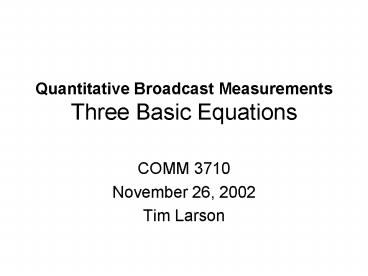Quantitative Broadcast Measurements Three Basic Equations - PowerPoint PPT Presentation
1 / 21
Title:
Quantitative Broadcast Measurements Three Basic Equations
Description:
For example, let's say there are 10,000 persons in. the population we are measuring. ... overlooks one of the key benefits of radio as a medium: Narrowcasting. ... – PowerPoint PPT presentation
Number of Views:60
Avg rating:3.0/5.0
Title: Quantitative Broadcast Measurements Three Basic Equations
1
Quantitative Broadcast MeasurementsThree Basic
Equations
- COMM 3710
- November 26, 2002
- Tim Larson
2
Three Basic Equations Average Quarter-Hour
Rating AQH Persons Population of Sex/Age/
cell Average Quarter-Hour Share AQH Persons
PUR or HUT CUME Rating CUME Audience Pop. Of
Sex/Age cell
3
Average Quarter-Hour Rating Rating Persons
listening to your station
Overall Population For example, lets say there
are 10,000 persons in the population we are
measuring. In a given period, there are 300
people listening to your station. 300
0.03 or 3 10,000
4
Average Quarter Hour Share Share Persons
listening to your station (PUR) All persons
listening to radio 300 0.06 or
6 5,000
5
CUME Rating CUME rating Total of
different persons tuned to your station
Population 500 0.05 or 5
10,000
6
6AM
AQH 3 CUME 5
ABC
ABD
645AM
615AM
BD
ABCE
630AM
7
Other Important Equations Time Spent
Listening AQH Persons X Number of 1/4-Hours in
daypart CUME Persons (of corresponding
daypart) Lets say we have an AQH Persons of
300 and our CUME persons is 5,000, and we want
to figure our TSL for morning drive (Mon-Fri
6AM-10AM). which consists of 80 quarter hours.
TSL 300 X 80 24,000 4.8 quarter
hours 5,000 5,000
8
Turnover Rate CUME Persons AQH
Persons Turnover (Persons 18-34) CUME
Persons (Persons 18-34) AQH
Persons (Persons 18-34) CUME persons
3,600 12 AQH persons 300.
9
Reach and Frequency Reach identifies the
estimated number of different people reached by a
schedule. It is the unduplicated audience a
station delivers. Reach can be expressed either
as different persons or as a rating. Frequency
is the average number of times the unduplicated
listener will hear an advertising message.
10
Average Frequency Gross
Impressions Net Reach of Schedule
(persons) or Gross Rating
Points Net Reach of Schedule (percent) Gross
Impressions Number of times record/spot is
played X AQH Audience
11
Average Frequency Gross Impressions Reach
of Schedule (Persons) AQH persons 9,100
CUME persons is 201,200 No. of Spots in
Schedule 50 Gross Impressions 455,000 AF
9,100 X 50 201,200 2.26 times on average
12
Gross Rating Points (GRPs) are the number
of rating points a schedule will
deliver. Daypart of Spots AQH Rating
GRPs M-F 6A-10A 4 X 6 24 M-F
10A-3P 6 X 5 30 M-F 3P-7P 4 X 8 32 Sat.
10A-3P 2 X 4 8 Su n. 10A-3p 2 X 3
6 Total GRPs 100
13
Cost Per Gross Rating Point CPP
Cost of Schedule 1,300 13 CPP
Gross Rating Points 100 A point is
1 of the audience. CPP calculates the cost of
each GRP. Cost-per-point is based on rating
points derived from a stations AQH
audience multiplied by the number of
spots. Assumes 50 per spot 50 X 26 1,300
14
Cost per rating point vs.Reach and Frequency
- CPP
- tells nothing about the campaigns effectiveness
within your target demo or how many of your
target consumers you reached at what frequency. - overlooks one of the key benefits of radio as a
medium Narrowcasting. - is the cost of reaching an AQH persons audience
of one percent, i.e., one percent of the
population for a given demographic group.
15
Reach and FrequencyBetter way than CPP to buy
R/TV
- Radio is a target medium where reaching the
entire population is not achievable. - Radio is Narrowcasting
- Television is a mass marketing medium on which
you have the potential to reach a very broad
segment of the population. - Television is Broadcasting
16
Optimum Effective Scheduling (OES)
- Based on the principle that you need to reach at
least 50 of your target audience a minimum of
three times in order to be effective. - Takes into consideration this simple rule
-Expose your target to the message with enough
frequency to produce an effect.
17
Calculating OES Spot Levelper week in this case
- 1. Calculate your stations weekly turnover rate
CUME divided by AQH - 2. Multiply turnover rate by a constant value of
3.29. - 3. The number results in the quantity of spots
required weekly to achieve an effective schedule. - Example CUME persons 3,600 12
- AQH persons 300.
-
12 X 3.29
(39.48) or 40 commercials each week
18
Turnover Rate CUME Persons AQH
Persons Turnover (Persons 18-34) CUME
Persons (Persons 18-34) AQH
Persons (Persons 18-34) CUME persons
3,600 12 AQH persons 300.
19
Calculating OES Reach Level
- 1. Multiply your stations CUME by .46
- 2. The resulting number is the reach goal for an
effective schedule. - Example 201,200 X .46 92,552
- This means you need to reach 92,552 prospects
with your message at least three times per week
on your station to be effective.
20
Research and Conventional Wisdom About OES
- Consumers must hear or see your message a minimum
of three times in order to be effective. - Learning occurs with repetition and advertising
is a form of learning. - Average frequency produces empty reach.
- Ask not how many spots you can afford but how
many weeks of OES can you afford? - OES has better chance of producing results for
your client.
21
Goal of Quantitative (and Qualitative) Audience
Research
- Change Numbers to Dollars!































